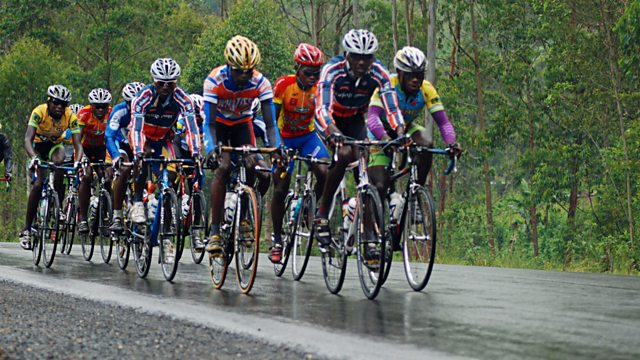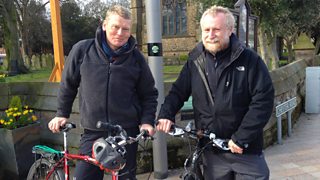Rwanda Cycling
Tim Mansel spends a week with Rwanda's national cycling team to see how one of the world's most physically challenging sports is helping Rwandans confront their traumatic past.
Rwanda is a nation of bicycles; large cumbersome machines, piled high with sacks of coffee or potatoes, so heavy they can only be pushed up the steep winding roads in this "land of a thousand hills."
Rwanda -- a country known only for the genocide of 1994, when an estimated 800,000 people, mainly ethnic Tutsis, were murdered in cold blood in a mere 100 days -- is also a nation in need of heroes.
It may now have found them: lycra-clad athletes in helmets and wrap-around sunglasses on five thousand dollar racing bikes. They are Team Rwanda, the national cycling team, its tightly packed and brightly coloured peloton now a familiar sight on their training rides on the roads around Ruhengeri in the country's north-west, not far from the border with Uganda.
For this week's Crossing Continents Tim Mansel has spent a week with Team Rwanda as they prepare for their latest international competition, the Tour of Eritrea. The team assembles on a Monday night from all over Rwanda. They come by bike, some after riding for three or four hours, one after a ride of six. Their week is a series of gruelling rides, nutritious food, and daily yoga, all under the critical eye of their outspoken American coach, Jock Boyer.
It's impossible to spend time in Rwanda without being confronted by the genocide. A large purple banner adorns the main street in Ruhengeri, its message unmissable - Jenocide, it proclaims - and this year's slogan: "Learning from History to build a bright future." And only a few hundred yards from where the riders live is the town's genocide memorial, a walled garden dominated by a disturbing monument - the figure of a man pleading for his life and a machete that appears to be dripping in blood.
Team Rwanda is not immune from the genocide, indeed it makes explicit connections. Its website features biographies of several of its riders: Rafiki Uwimana, a small child in 1994, sent by his parents to live in the countryside to escape the horrors of the capital Kigali, forced to hide in the forest from the Hutu militias, and almost dying of malaria before being saved by the Tutsi RPF militia invading from Uganda; or Obed Rugovera, who lost three siblings and two uncles in the carnage.
"The genocide has affected every one of the riders profoundly and you can feel it even without talking about it," says the coach, Jock Boyer. "Cycling...gives them the hope that they can buy a house, provide for their family, do something they're good at and that they're recognised for and that the country is not just going to be known for a genocide.".
Last on
More episodes
Previous
Broadcast
- Thu 2 Aug 2012 11:00大象传媒 Radio 4 FM
Featured in...
![]()
On your bike—Costing the Earth, Cycle City
A selection of programmes about cycling in the UK and beyond.
Podcast
-
![]()
Crossing Continents
Stories from around the world and the people at the heart of them.



